Comprehensive Report: Alcohol and Mental Health Policy in the UK
VerifiedAdded on 2022/01/03
|18
|6202
|403
Report
AI Summary
This report provides a comprehensive analysis of the Alcohol and Mental Health Policy in the UK. It examines the evidence linking alcohol misuse to various mental health disorders and explores the theoretical approaches and policy developments in this area. The report details the health and social care practices within the UK, focusing on policy development stages, including agenda setting, policy formulation, implementation challenges, and evaluation. It highlights the co-morbid conditions, barriers to service integration, and the actions taken by the government to address these issues, including the development of strategies and plans to improve support for individuals with co-occurring conditions. The report also discusses the need for integrated services, funding challenges, and the importance of addressing the needs of those affected by alcohol and mental health problems. It covers key policy aspects, documents, and strategies implemented by the UK government and NHS England to control alcohol use and improve mental health outcomes.
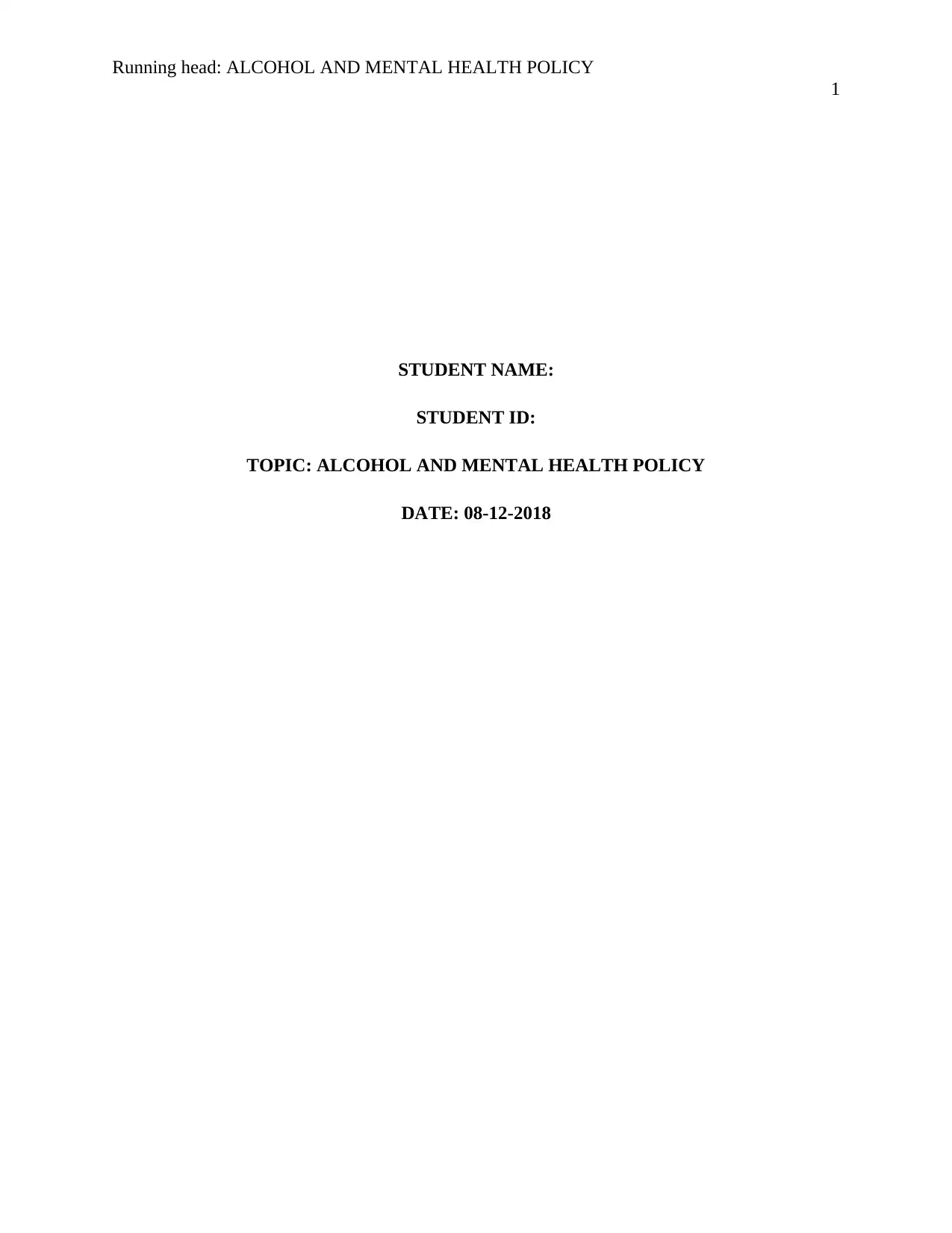
Running head: ALCOHOL AND MENTAL HEALTH POLICY
1
STUDENT NAME:
STUDENT ID:
TOPIC: ALCOHOL AND MENTAL HEALTH POLICY
DATE: 08-12-2018
1
STUDENT NAME:
STUDENT ID:
TOPIC: ALCOHOL AND MENTAL HEALTH POLICY
DATE: 08-12-2018
Paraphrase This Document
Need a fresh take? Get an instant paraphrase of this document with our AI Paraphraser
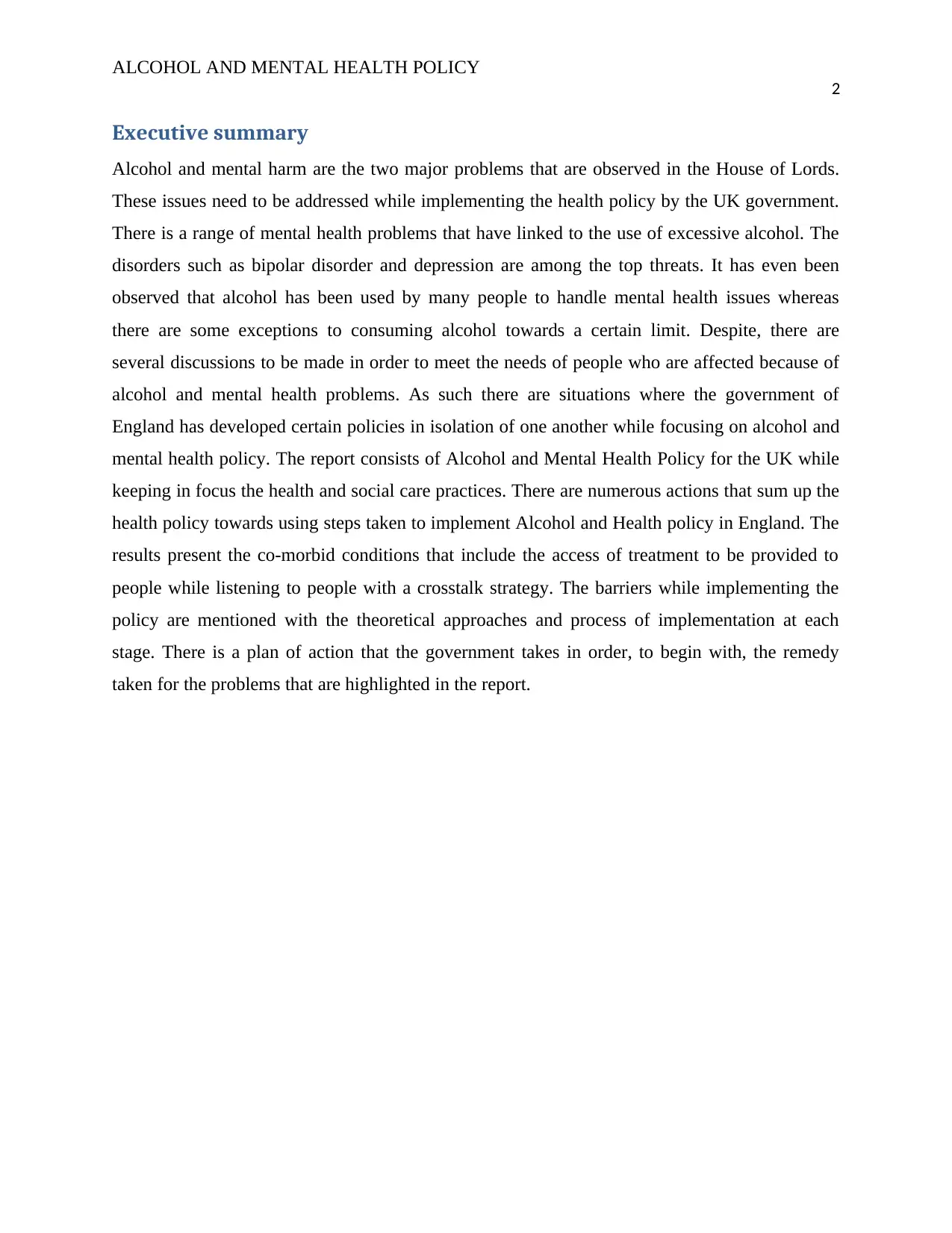
ALCOHOL AND MENTAL HEALTH POLICY
2
Executive summary
Alcohol and mental harm are the two major problems that are observed in the House of Lords.
These issues need to be addressed while implementing the health policy by the UK government.
There is a range of mental health problems that have linked to the use of excessive alcohol. The
disorders such as bipolar disorder and depression are among the top threats. It has even been
observed that alcohol has been used by many people to handle mental health issues whereas
there are some exceptions to consuming alcohol towards a certain limit. Despite, there are
several discussions to be made in order to meet the needs of people who are affected because of
alcohol and mental health problems. As such there are situations where the government of
England has developed certain policies in isolation of one another while focusing on alcohol and
mental health policy. The report consists of Alcohol and Mental Health Policy for the UK while
keeping in focus the health and social care practices. There are numerous actions that sum up the
health policy towards using steps taken to implement Alcohol and Health policy in England. The
results present the co-morbid conditions that include the access of treatment to be provided to
people while listening to people with a crosstalk strategy. The barriers while implementing the
policy are mentioned with the theoretical approaches and process of implementation at each
stage. There is a plan of action that the government takes in order, to begin with, the remedy
taken for the problems that are highlighted in the report.
2
Executive summary
Alcohol and mental harm are the two major problems that are observed in the House of Lords.
These issues need to be addressed while implementing the health policy by the UK government.
There is a range of mental health problems that have linked to the use of excessive alcohol. The
disorders such as bipolar disorder and depression are among the top threats. It has even been
observed that alcohol has been used by many people to handle mental health issues whereas
there are some exceptions to consuming alcohol towards a certain limit. Despite, there are
several discussions to be made in order to meet the needs of people who are affected because of
alcohol and mental health problems. As such there are situations where the government of
England has developed certain policies in isolation of one another while focusing on alcohol and
mental health policy. The report consists of Alcohol and Mental Health Policy for the UK while
keeping in focus the health and social care practices. There are numerous actions that sum up the
health policy towards using steps taken to implement Alcohol and Health policy in England. The
results present the co-morbid conditions that include the access of treatment to be provided to
people while listening to people with a crosstalk strategy. The barriers while implementing the
policy are mentioned with the theoretical approaches and process of implementation at each
stage. There is a plan of action that the government takes in order, to begin with, the remedy
taken for the problems that are highlighted in the report.
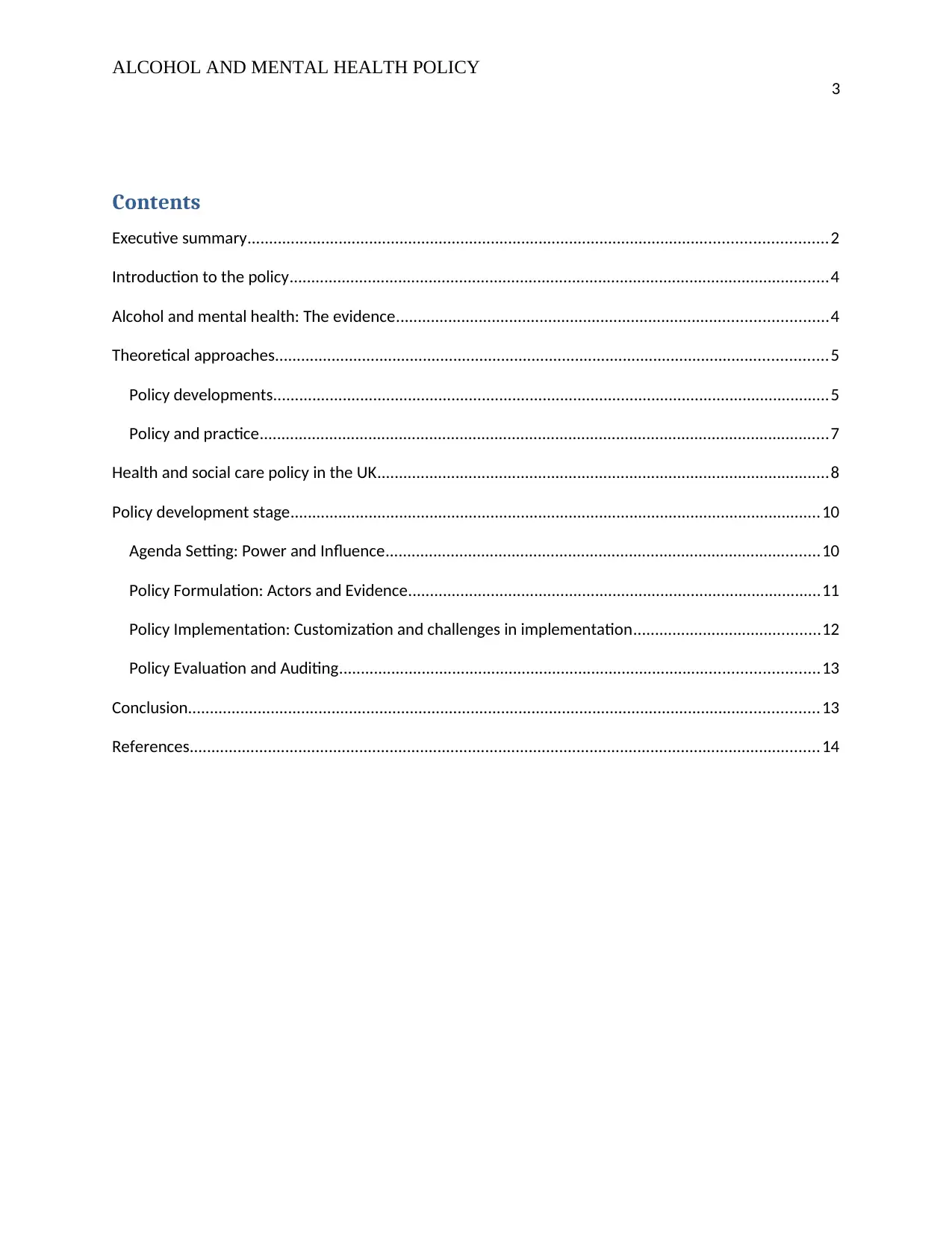
ALCOHOL AND MENTAL HEALTH POLICY
3
Contents
Executive summary.....................................................................................................................................2
Introduction to the policy............................................................................................................................4
Alcohol and mental health: The evidence...................................................................................................4
Theoretical approaches...............................................................................................................................5
Policy developments................................................................................................................................5
Policy and practice...................................................................................................................................7
Health and social care policy in the UK........................................................................................................8
Policy development stage..........................................................................................................................10
Agenda Setting: Power and Influence....................................................................................................10
Policy Formulation: Actors and Evidence...............................................................................................11
Policy Implementation: Customization and challenges in implementation...........................................12
Policy Evaluation and Auditing..............................................................................................................13
Conclusion.................................................................................................................................................13
References.................................................................................................................................................14
3
Contents
Executive summary.....................................................................................................................................2
Introduction to the policy............................................................................................................................4
Alcohol and mental health: The evidence...................................................................................................4
Theoretical approaches...............................................................................................................................5
Policy developments................................................................................................................................5
Policy and practice...................................................................................................................................7
Health and social care policy in the UK........................................................................................................8
Policy development stage..........................................................................................................................10
Agenda Setting: Power and Influence....................................................................................................10
Policy Formulation: Actors and Evidence...............................................................................................11
Policy Implementation: Customization and challenges in implementation...........................................12
Policy Evaluation and Auditing..............................................................................................................13
Conclusion.................................................................................................................................................13
References.................................................................................................................................................14
⊘ This is a preview!⊘
Do you want full access?
Subscribe today to unlock all pages.

Trusted by 1+ million students worldwide
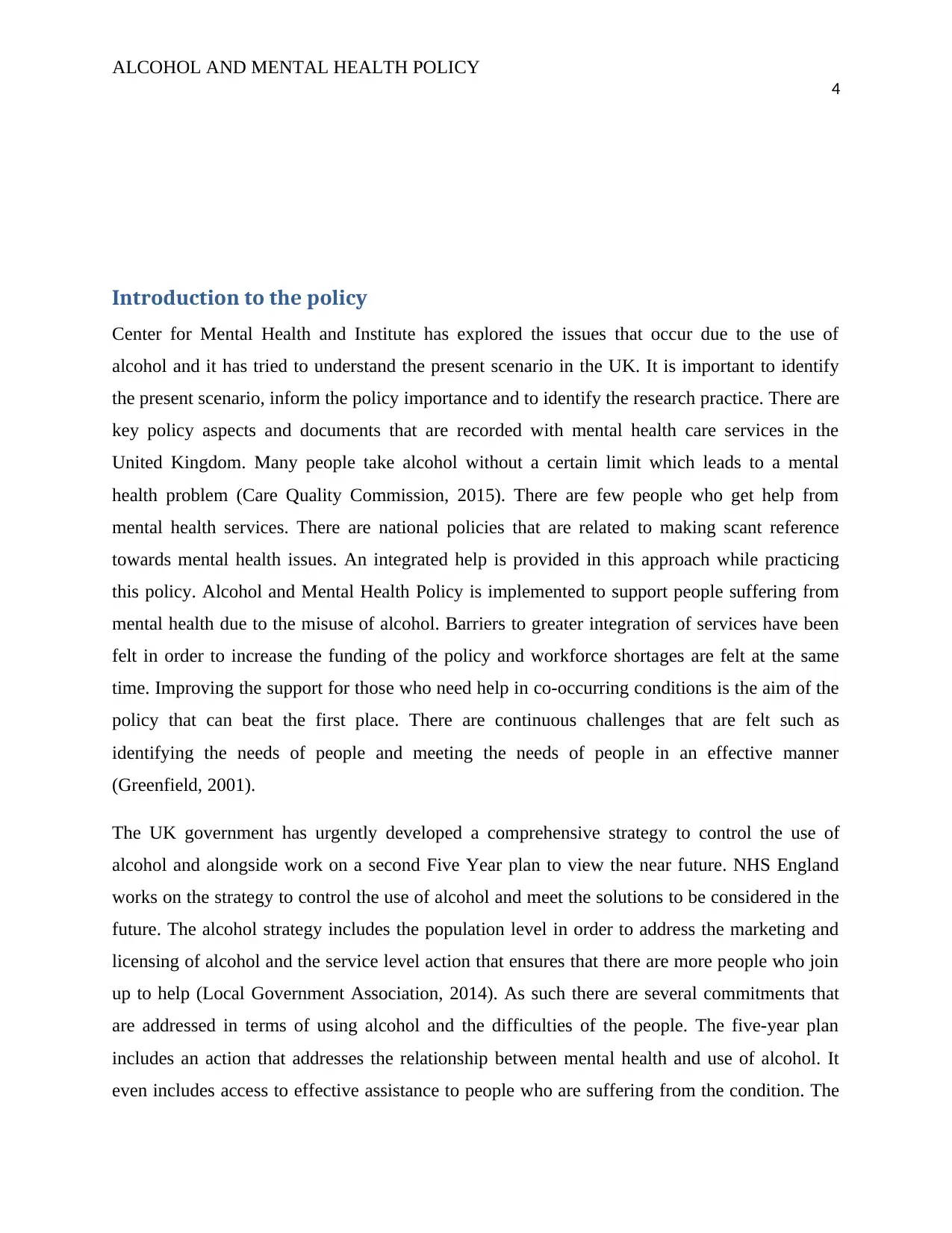
ALCOHOL AND MENTAL HEALTH POLICY
4
Introduction to the policy
Center for Mental Health and Institute has explored the issues that occur due to the use of
alcohol and it has tried to understand the present scenario in the UK. It is important to identify
the present scenario, inform the policy importance and to identify the research practice. There are
key policy aspects and documents that are recorded with mental health care services in the
United Kingdom. Many people take alcohol without a certain limit which leads to a mental
health problem (Care Quality Commission, 2015). There are few people who get help from
mental health services. There are national policies that are related to making scant reference
towards mental health issues. An integrated help is provided in this approach while practicing
this policy. Alcohol and Mental Health Policy is implemented to support people suffering from
mental health due to the misuse of alcohol. Barriers to greater integration of services have been
felt in order to increase the funding of the policy and workforce shortages are felt at the same
time. Improving the support for those who need help in co-occurring conditions is the aim of the
policy that can beat the first place. There are continuous challenges that are felt such as
identifying the needs of people and meeting the needs of people in an effective manner
(Greenfield, 2001).
The UK government has urgently developed a comprehensive strategy to control the use of
alcohol and alongside work on a second Five Year plan to view the near future. NHS England
works on the strategy to control the use of alcohol and meet the solutions to be considered in the
future. The alcohol strategy includes the population level in order to address the marketing and
licensing of alcohol and the service level action that ensures that there are more people who join
up to help (Local Government Association, 2014). As such there are several commitments that
are addressed in terms of using alcohol and the difficulties of the people. The five-year plan
includes an action that addresses the relationship between mental health and use of alcohol. It
even includes access to effective assistance to people who are suffering from the condition. The
4
Introduction to the policy
Center for Mental Health and Institute has explored the issues that occur due to the use of
alcohol and it has tried to understand the present scenario in the UK. It is important to identify
the present scenario, inform the policy importance and to identify the research practice. There are
key policy aspects and documents that are recorded with mental health care services in the
United Kingdom. Many people take alcohol without a certain limit which leads to a mental
health problem (Care Quality Commission, 2015). There are few people who get help from
mental health services. There are national policies that are related to making scant reference
towards mental health issues. An integrated help is provided in this approach while practicing
this policy. Alcohol and Mental Health Policy is implemented to support people suffering from
mental health due to the misuse of alcohol. Barriers to greater integration of services have been
felt in order to increase the funding of the policy and workforce shortages are felt at the same
time. Improving the support for those who need help in co-occurring conditions is the aim of the
policy that can beat the first place. There are continuous challenges that are felt such as
identifying the needs of people and meeting the needs of people in an effective manner
(Greenfield, 2001).
The UK government has urgently developed a comprehensive strategy to control the use of
alcohol and alongside work on a second Five Year plan to view the near future. NHS England
works on the strategy to control the use of alcohol and meet the solutions to be considered in the
future. The alcohol strategy includes the population level in order to address the marketing and
licensing of alcohol and the service level action that ensures that there are more people who join
up to help (Local Government Association, 2014). As such there are several commitments that
are addressed in terms of using alcohol and the difficulties of the people. The five-year plan
includes an action that addresses the relationship between mental health and use of alcohol. It
even includes access to effective assistance to people who are suffering from the condition. The
Paraphrase This Document
Need a fresh take? Get an instant paraphrase of this document with our AI Paraphraser
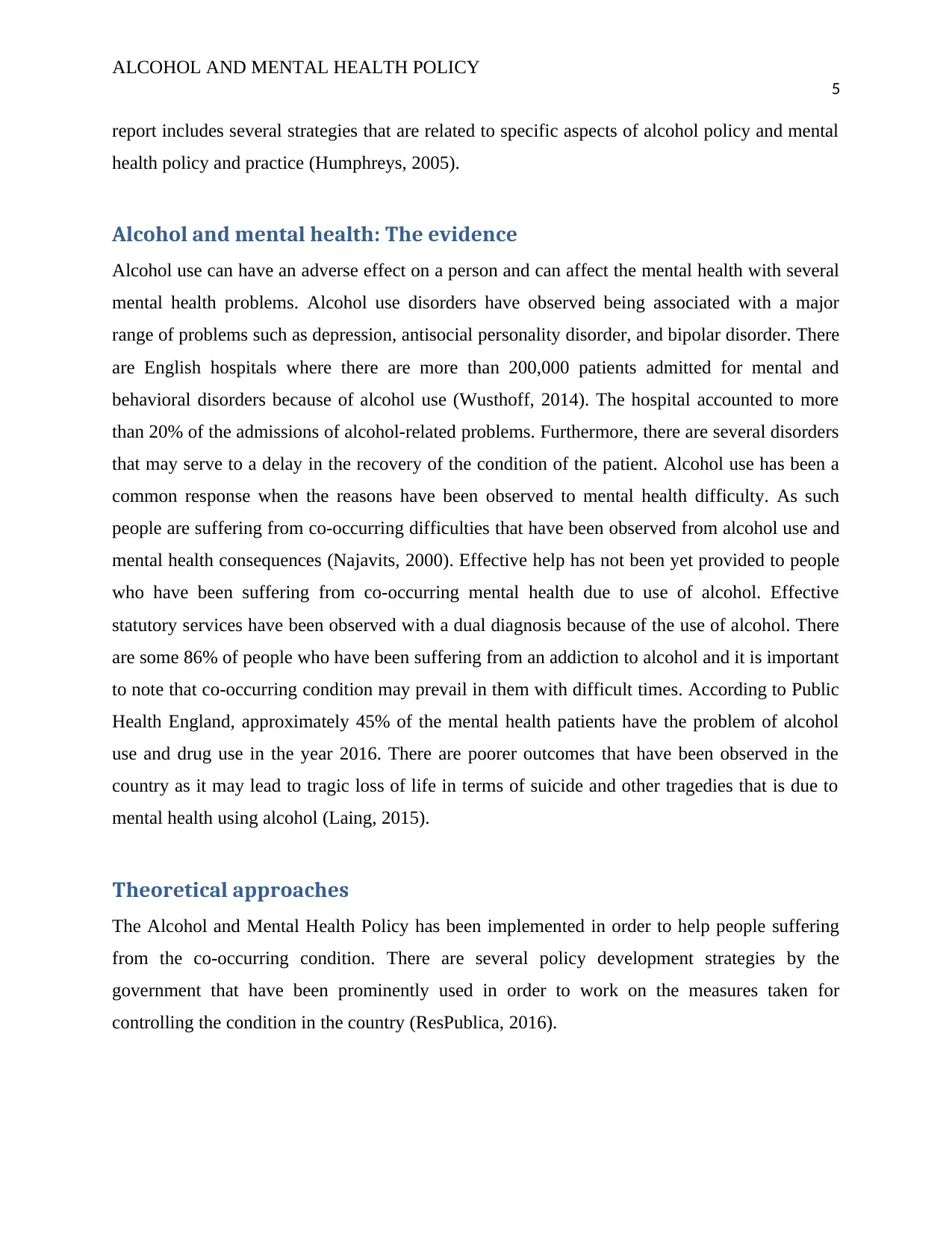
ALCOHOL AND MENTAL HEALTH POLICY
5
report includes several strategies that are related to specific aspects of alcohol policy and mental
health policy and practice (Humphreys, 2005).
Alcohol and mental health: The evidence
Alcohol use can have an adverse effect on a person and can affect the mental health with several
mental health problems. Alcohol use disorders have observed being associated with a major
range of problems such as depression, antisocial personality disorder, and bipolar disorder. There
are English hospitals where there are more than 200,000 patients admitted for mental and
behavioral disorders because of alcohol use (Wusthoff, 2014). The hospital accounted to more
than 20% of the admissions of alcohol-related problems. Furthermore, there are several disorders
that may serve to a delay in the recovery of the condition of the patient. Alcohol use has been a
common response when the reasons have been observed to mental health difficulty. As such
people are suffering from co-occurring difficulties that have been observed from alcohol use and
mental health consequences (Najavits, 2000). Effective help has not been yet provided to people
who have been suffering from co-occurring mental health due to use of alcohol. Effective
statutory services have been observed with a dual diagnosis because of the use of alcohol. There
are some 86% of people who have been suffering from an addiction to alcohol and it is important
to note that co-occurring condition may prevail in them with difficult times. According to Public
Health England, approximately 45% of the mental health patients have the problem of alcohol
use and drug use in the year 2016. There are poorer outcomes that have been observed in the
country as it may lead to tragic loss of life in terms of suicide and other tragedies that is due to
mental health using alcohol (Laing, 2015).
Theoretical approaches
The Alcohol and Mental Health Policy has been implemented in order to help people suffering
from the co-occurring condition. There are several policy development strategies by the
government that have been prominently used in order to work on the measures taken for
controlling the condition in the country (ResPublica, 2016).
5
report includes several strategies that are related to specific aspects of alcohol policy and mental
health policy and practice (Humphreys, 2005).
Alcohol and mental health: The evidence
Alcohol use can have an adverse effect on a person and can affect the mental health with several
mental health problems. Alcohol use disorders have observed being associated with a major
range of problems such as depression, antisocial personality disorder, and bipolar disorder. There
are English hospitals where there are more than 200,000 patients admitted for mental and
behavioral disorders because of alcohol use (Wusthoff, 2014). The hospital accounted to more
than 20% of the admissions of alcohol-related problems. Furthermore, there are several disorders
that may serve to a delay in the recovery of the condition of the patient. Alcohol use has been a
common response when the reasons have been observed to mental health difficulty. As such
people are suffering from co-occurring difficulties that have been observed from alcohol use and
mental health consequences (Najavits, 2000). Effective help has not been yet provided to people
who have been suffering from co-occurring mental health due to use of alcohol. Effective
statutory services have been observed with a dual diagnosis because of the use of alcohol. There
are some 86% of people who have been suffering from an addiction to alcohol and it is important
to note that co-occurring condition may prevail in them with difficult times. According to Public
Health England, approximately 45% of the mental health patients have the problem of alcohol
use and drug use in the year 2016. There are poorer outcomes that have been observed in the
country as it may lead to tragic loss of life in terms of suicide and other tragedies that is due to
mental health using alcohol (Laing, 2015).
Theoretical approaches
The Alcohol and Mental Health Policy has been implemented in order to help people suffering
from the co-occurring condition. There are several policy development strategies by the
government that have been prominently used in order to work on the measures taken for
controlling the condition in the country (ResPublica, 2016).
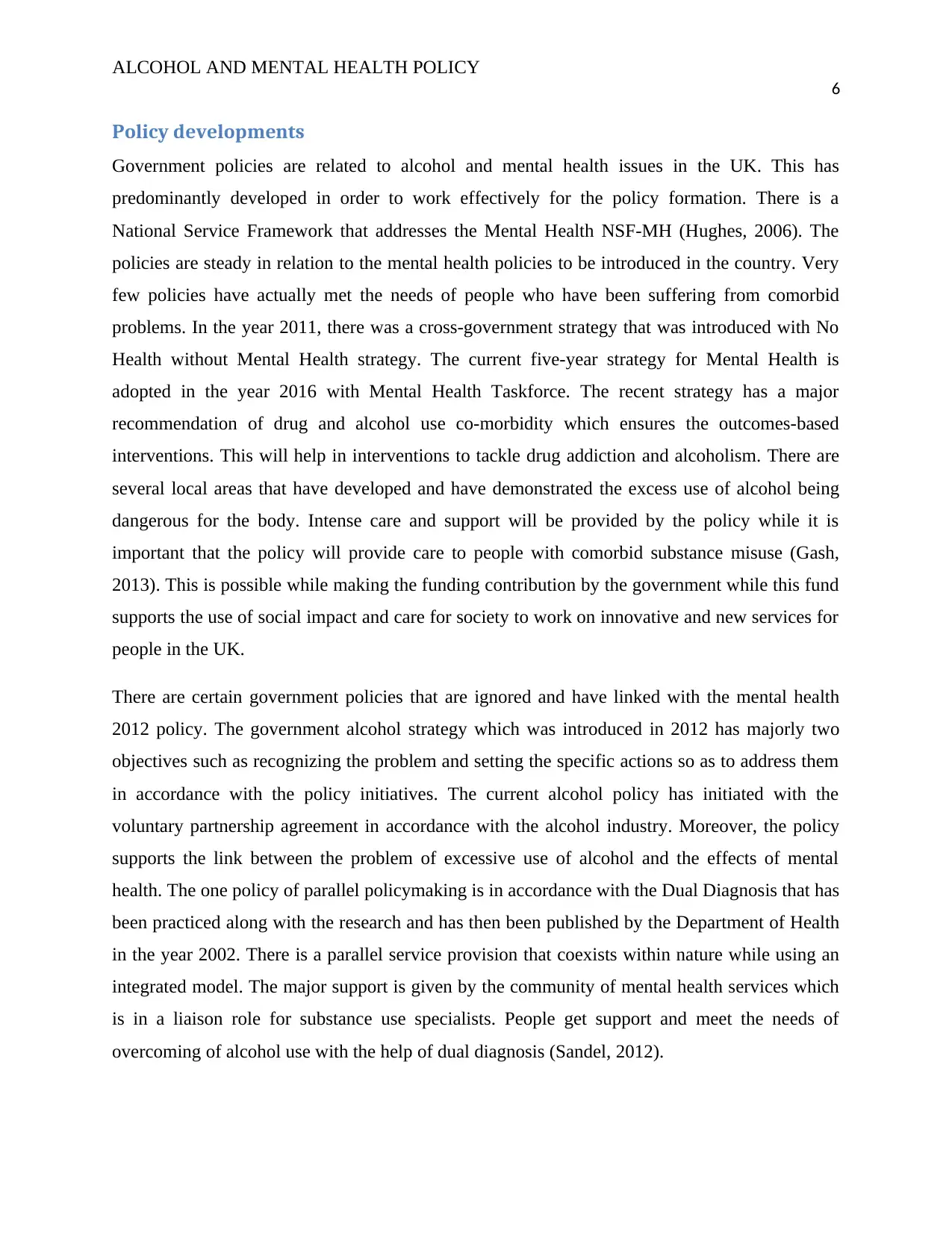
ALCOHOL AND MENTAL HEALTH POLICY
6
Policy developments
Government policies are related to alcohol and mental health issues in the UK. This has
predominantly developed in order to work effectively for the policy formation. There is a
National Service Framework that addresses the Mental Health NSF-MH (Hughes, 2006). The
policies are steady in relation to the mental health policies to be introduced in the country. Very
few policies have actually met the needs of people who have been suffering from comorbid
problems. In the year 2011, there was a cross-government strategy that was introduced with No
Health without Mental Health strategy. The current five-year strategy for Mental Health is
adopted in the year 2016 with Mental Health Taskforce. The recent strategy has a major
recommendation of drug and alcohol use co-morbidity which ensures the outcomes-based
interventions. This will help in interventions to tackle drug addiction and alcoholism. There are
several local areas that have developed and have demonstrated the excess use of alcohol being
dangerous for the body. Intense care and support will be provided by the policy while it is
important that the policy will provide care to people with comorbid substance misuse (Gash,
2013). This is possible while making the funding contribution by the government while this fund
supports the use of social impact and care for society to work on innovative and new services for
people in the UK.
There are certain government policies that are ignored and have linked with the mental health
2012 policy. The government alcohol strategy which was introduced in 2012 has majorly two
objectives such as recognizing the problem and setting the specific actions so as to address them
in accordance with the policy initiatives. The current alcohol policy has initiated with the
voluntary partnership agreement in accordance with the alcohol industry. Moreover, the policy
supports the link between the problem of excessive use of alcohol and the effects of mental
health. The one policy of parallel policymaking is in accordance with the Dual Diagnosis that has
been practiced along with the research and has then been published by the Department of Health
in the year 2002. There is a parallel service provision that coexists within nature while using an
integrated model. The major support is given by the community of mental health services which
is in a liaison role for substance use specialists. People get support and meet the needs of
overcoming of alcohol use with the help of dual diagnosis (Sandel, 2012).
6
Policy developments
Government policies are related to alcohol and mental health issues in the UK. This has
predominantly developed in order to work effectively for the policy formation. There is a
National Service Framework that addresses the Mental Health NSF-MH (Hughes, 2006). The
policies are steady in relation to the mental health policies to be introduced in the country. Very
few policies have actually met the needs of people who have been suffering from comorbid
problems. In the year 2011, there was a cross-government strategy that was introduced with No
Health without Mental Health strategy. The current five-year strategy for Mental Health is
adopted in the year 2016 with Mental Health Taskforce. The recent strategy has a major
recommendation of drug and alcohol use co-morbidity which ensures the outcomes-based
interventions. This will help in interventions to tackle drug addiction and alcoholism. There are
several local areas that have developed and have demonstrated the excess use of alcohol being
dangerous for the body. Intense care and support will be provided by the policy while it is
important that the policy will provide care to people with comorbid substance misuse (Gash,
2013). This is possible while making the funding contribution by the government while this fund
supports the use of social impact and care for society to work on innovative and new services for
people in the UK.
There are certain government policies that are ignored and have linked with the mental health
2012 policy. The government alcohol strategy which was introduced in 2012 has majorly two
objectives such as recognizing the problem and setting the specific actions so as to address them
in accordance with the policy initiatives. The current alcohol policy has initiated with the
voluntary partnership agreement in accordance with the alcohol industry. Moreover, the policy
supports the link between the problem of excessive use of alcohol and the effects of mental
health. The one policy of parallel policymaking is in accordance with the Dual Diagnosis that has
been practiced along with the research and has then been published by the Department of Health
in the year 2002. There is a parallel service provision that coexists within nature while using an
integrated model. The major support is given by the community of mental health services which
is in a liaison role for substance use specialists. People get support and meet the needs of
overcoming of alcohol use with the help of dual diagnosis (Sandel, 2012).
⊘ This is a preview!⊘
Do you want full access?
Subscribe today to unlock all pages.

Trusted by 1+ million students worldwide
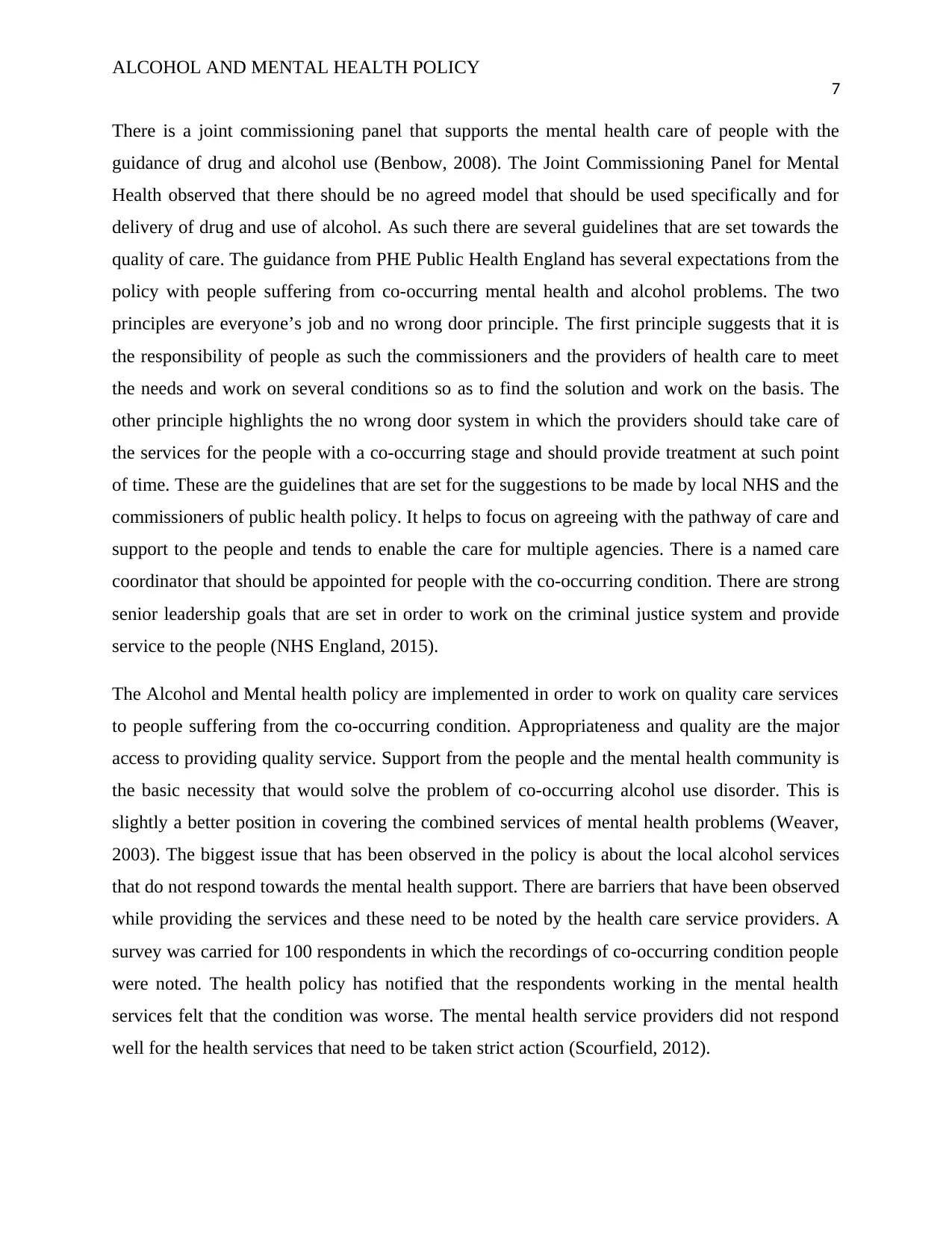
ALCOHOL AND MENTAL HEALTH POLICY
7
There is a joint commissioning panel that supports the mental health care of people with the
guidance of drug and alcohol use (Benbow, 2008). The Joint Commissioning Panel for Mental
Health observed that there should be no agreed model that should be used specifically and for
delivery of drug and use of alcohol. As such there are several guidelines that are set towards the
quality of care. The guidance from PHE Public Health England has several expectations from the
policy with people suffering from co-occurring mental health and alcohol problems. The two
principles are everyone’s job and no wrong door principle. The first principle suggests that it is
the responsibility of people as such the commissioners and the providers of health care to meet
the needs and work on several conditions so as to find the solution and work on the basis. The
other principle highlights the no wrong door system in which the providers should take care of
the services for the people with a co-occurring stage and should provide treatment at such point
of time. These are the guidelines that are set for the suggestions to be made by local NHS and the
commissioners of public health policy. It helps to focus on agreeing with the pathway of care and
support to the people and tends to enable the care for multiple agencies. There is a named care
coordinator that should be appointed for people with the co-occurring condition. There are strong
senior leadership goals that are set in order to work on the criminal justice system and provide
service to the people (NHS England, 2015).
The Alcohol and Mental health policy are implemented in order to work on quality care services
to people suffering from the co-occurring condition. Appropriateness and quality are the major
access to providing quality service. Support from the people and the mental health community is
the basic necessity that would solve the problem of co-occurring alcohol use disorder. This is
slightly a better position in covering the combined services of mental health problems (Weaver,
2003). The biggest issue that has been observed in the policy is about the local alcohol services
that do not respond towards the mental health support. There are barriers that have been observed
while providing the services and these need to be noted by the health care service providers. A
survey was carried for 100 respondents in which the recordings of co-occurring condition people
were noted. The health policy has notified that the respondents working in the mental health
services felt that the condition was worse. The mental health service providers did not respond
well for the health services that need to be taken strict action (Scourfield, 2012).
7
There is a joint commissioning panel that supports the mental health care of people with the
guidance of drug and alcohol use (Benbow, 2008). The Joint Commissioning Panel for Mental
Health observed that there should be no agreed model that should be used specifically and for
delivery of drug and use of alcohol. As such there are several guidelines that are set towards the
quality of care. The guidance from PHE Public Health England has several expectations from the
policy with people suffering from co-occurring mental health and alcohol problems. The two
principles are everyone’s job and no wrong door principle. The first principle suggests that it is
the responsibility of people as such the commissioners and the providers of health care to meet
the needs and work on several conditions so as to find the solution and work on the basis. The
other principle highlights the no wrong door system in which the providers should take care of
the services for the people with a co-occurring stage and should provide treatment at such point
of time. These are the guidelines that are set for the suggestions to be made by local NHS and the
commissioners of public health policy. It helps to focus on agreeing with the pathway of care and
support to the people and tends to enable the care for multiple agencies. There is a named care
coordinator that should be appointed for people with the co-occurring condition. There are strong
senior leadership goals that are set in order to work on the criminal justice system and provide
service to the people (NHS England, 2015).
The Alcohol and Mental health policy are implemented in order to work on quality care services
to people suffering from the co-occurring condition. Appropriateness and quality are the major
access to providing quality service. Support from the people and the mental health community is
the basic necessity that would solve the problem of co-occurring alcohol use disorder. This is
slightly a better position in covering the combined services of mental health problems (Weaver,
2003). The biggest issue that has been observed in the policy is about the local alcohol services
that do not respond towards the mental health support. There are barriers that have been observed
while providing the services and these need to be noted by the health care service providers. A
survey was carried for 100 respondents in which the recordings of co-occurring condition people
were noted. The health policy has notified that the respondents working in the mental health
services felt that the condition was worse. The mental health service providers did not respond
well for the health services that need to be taken strict action (Scourfield, 2012).
Paraphrase This Document
Need a fresh take? Get an instant paraphrase of this document with our AI Paraphraser
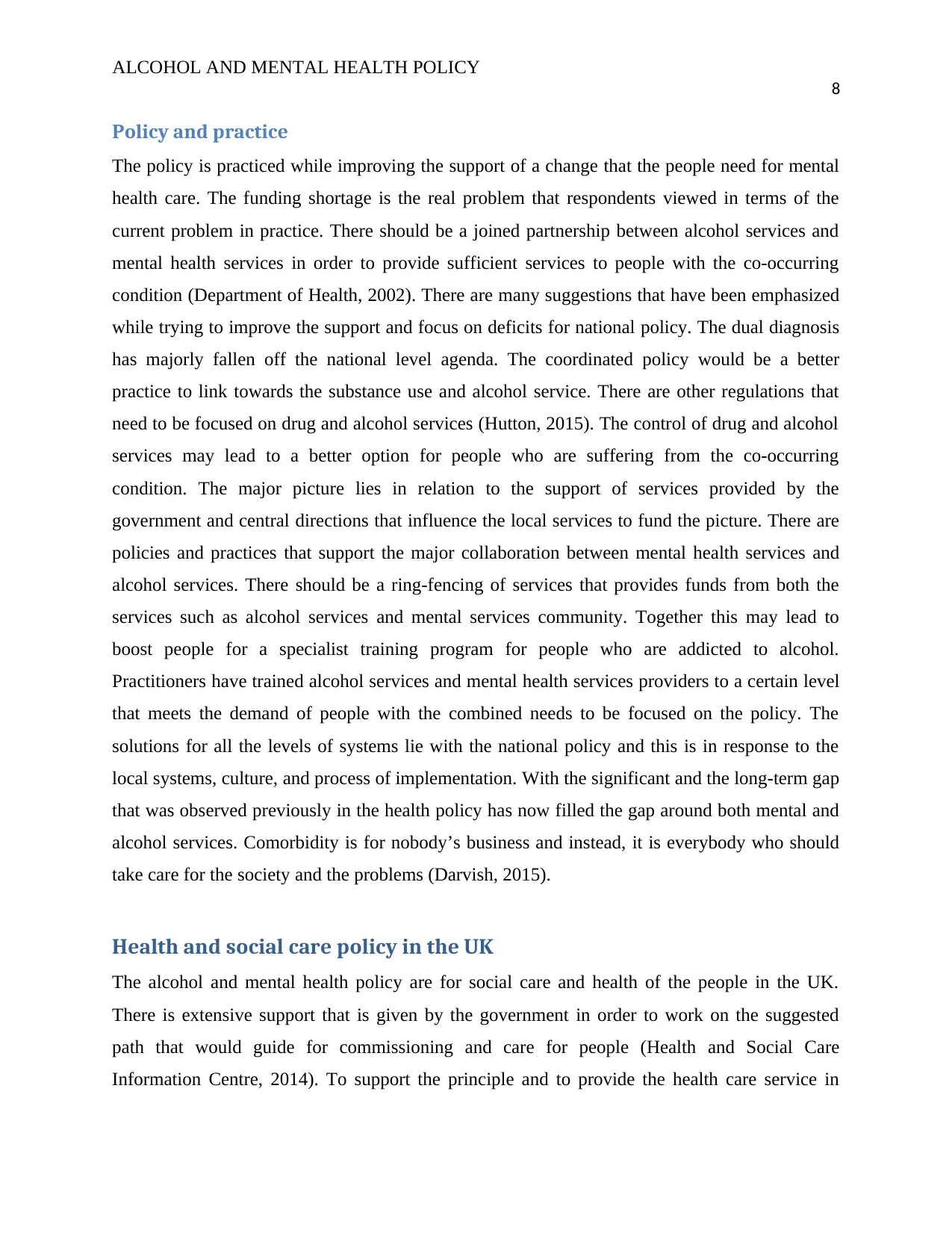
ALCOHOL AND MENTAL HEALTH POLICY
8
Policy and practice
The policy is practiced while improving the support of a change that the people need for mental
health care. The funding shortage is the real problem that respondents viewed in terms of the
current problem in practice. There should be a joined partnership between alcohol services and
mental health services in order to provide sufficient services to people with the co-occurring
condition (Department of Health, 2002). There are many suggestions that have been emphasized
while trying to improve the support and focus on deficits for national policy. The dual diagnosis
has majorly fallen off the national level agenda. The coordinated policy would be a better
practice to link towards the substance use and alcohol service. There are other regulations that
need to be focused on drug and alcohol services (Hutton, 2015). The control of drug and alcohol
services may lead to a better option for people who are suffering from the co-occurring
condition. The major picture lies in relation to the support of services provided by the
government and central directions that influence the local services to fund the picture. There are
policies and practices that support the major collaboration between mental health services and
alcohol services. There should be a ring-fencing of services that provides funds from both the
services such as alcohol services and mental services community. Together this may lead to
boost people for a specialist training program for people who are addicted to alcohol.
Practitioners have trained alcohol services and mental health services providers to a certain level
that meets the demand of people with the combined needs to be focused on the policy. The
solutions for all the levels of systems lie with the national policy and this is in response to the
local systems, culture, and process of implementation. With the significant and the long-term gap
that was observed previously in the health policy has now filled the gap around both mental and
alcohol services. Comorbidity is for nobody’s business and instead, it is everybody who should
take care for the society and the problems (Darvish, 2015).
Health and social care policy in the UK
The alcohol and mental health policy are for social care and health of the people in the UK.
There is extensive support that is given by the government in order to work on the suggested
path that would guide for commissioning and care for people (Health and Social Care
Information Centre, 2014). To support the principle and to provide the health care service in
8
Policy and practice
The policy is practiced while improving the support of a change that the people need for mental
health care. The funding shortage is the real problem that respondents viewed in terms of the
current problem in practice. There should be a joined partnership between alcohol services and
mental health services in order to provide sufficient services to people with the co-occurring
condition (Department of Health, 2002). There are many suggestions that have been emphasized
while trying to improve the support and focus on deficits for national policy. The dual diagnosis
has majorly fallen off the national level agenda. The coordinated policy would be a better
practice to link towards the substance use and alcohol service. There are other regulations that
need to be focused on drug and alcohol services (Hutton, 2015). The control of drug and alcohol
services may lead to a better option for people who are suffering from the co-occurring
condition. The major picture lies in relation to the support of services provided by the
government and central directions that influence the local services to fund the picture. There are
policies and practices that support the major collaboration between mental health services and
alcohol services. There should be a ring-fencing of services that provides funds from both the
services such as alcohol services and mental services community. Together this may lead to
boost people for a specialist training program for people who are addicted to alcohol.
Practitioners have trained alcohol services and mental health services providers to a certain level
that meets the demand of people with the combined needs to be focused on the policy. The
solutions for all the levels of systems lie with the national policy and this is in response to the
local systems, culture, and process of implementation. With the significant and the long-term gap
that was observed previously in the health policy has now filled the gap around both mental and
alcohol services. Comorbidity is for nobody’s business and instead, it is everybody who should
take care for the society and the problems (Darvish, 2015).
Health and social care policy in the UK
The alcohol and mental health policy are for social care and health of the people in the UK.
There is extensive support that is given by the government in order to work on the suggested
path that would guide for commissioning and care for people (Health and Social Care
Information Centre, 2014). To support the principle and to provide the health care service in
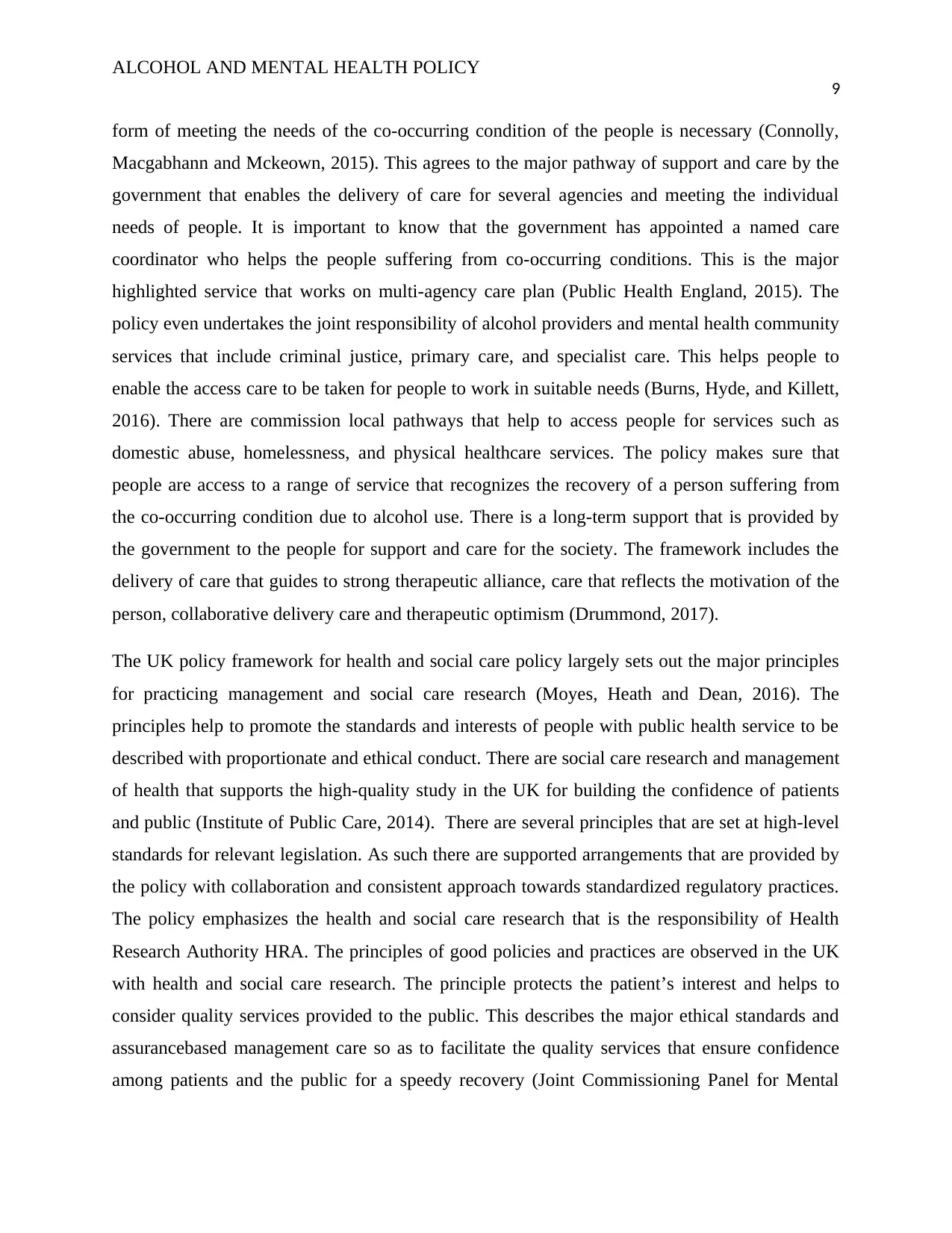
ALCOHOL AND MENTAL HEALTH POLICY
9
form of meeting the needs of the co-occurring condition of the people is necessary (Connolly,
Macgabhann and Mckeown, 2015). This agrees to the major pathway of support and care by the
government that enables the delivery of care for several agencies and meeting the individual
needs of people. It is important to know that the government has appointed a named care
coordinator who helps the people suffering from co-occurring conditions. This is the major
highlighted service that works on multi-agency care plan (Public Health England, 2015). The
policy even undertakes the joint responsibility of alcohol providers and mental health community
services that include criminal justice, primary care, and specialist care. This helps people to
enable the access care to be taken for people to work in suitable needs (Burns, Hyde, and Killett,
2016). There are commission local pathways that help to access people for services such as
domestic abuse, homelessness, and physical healthcare services. The policy makes sure that
people are access to a range of service that recognizes the recovery of a person suffering from
the co-occurring condition due to alcohol use. There is a long-term support that is provided by
the government to the people for support and care for the society. The framework includes the
delivery of care that guides to strong therapeutic alliance, care that reflects the motivation of the
person, collaborative delivery care and therapeutic optimism (Drummond, 2017).
The UK policy framework for health and social care policy largely sets out the major principles
for practicing management and social care research (Moyes, Heath and Dean, 2016). The
principles help to promote the standards and interests of people with public health service to be
described with proportionate and ethical conduct. There are social care research and management
of health that supports the high-quality study in the UK for building the confidence of patients
and public (Institute of Public Care, 2014). There are several principles that are set at high-level
standards for relevant legislation. As such there are supported arrangements that are provided by
the policy with collaboration and consistent approach towards standardized regulatory practices.
The policy emphasizes the health and social care research that is the responsibility of Health
Research Authority HRA. The principles of good policies and practices are observed in the UK
with health and social care research. The principle protects the patient’s interest and helps to
consider quality services provided to the public. This describes the major ethical standards and
assurancebased management care so as to facilitate the quality services that ensure confidence
among patients and the public for a speedy recovery (Joint Commissioning Panel for Mental
9
form of meeting the needs of the co-occurring condition of the people is necessary (Connolly,
Macgabhann and Mckeown, 2015). This agrees to the major pathway of support and care by the
government that enables the delivery of care for several agencies and meeting the individual
needs of people. It is important to know that the government has appointed a named care
coordinator who helps the people suffering from co-occurring conditions. This is the major
highlighted service that works on multi-agency care plan (Public Health England, 2015). The
policy even undertakes the joint responsibility of alcohol providers and mental health community
services that include criminal justice, primary care, and specialist care. This helps people to
enable the access care to be taken for people to work in suitable needs (Burns, Hyde, and Killett,
2016). There are commission local pathways that help to access people for services such as
domestic abuse, homelessness, and physical healthcare services. The policy makes sure that
people are access to a range of service that recognizes the recovery of a person suffering from
the co-occurring condition due to alcohol use. There is a long-term support that is provided by
the government to the people for support and care for the society. The framework includes the
delivery of care that guides to strong therapeutic alliance, care that reflects the motivation of the
person, collaborative delivery care and therapeutic optimism (Drummond, 2017).
The UK policy framework for health and social care policy largely sets out the major principles
for practicing management and social care research (Moyes, Heath and Dean, 2016). The
principles help to promote the standards and interests of people with public health service to be
described with proportionate and ethical conduct. There are social care research and management
of health that supports the high-quality study in the UK for building the confidence of patients
and public (Institute of Public Care, 2014). There are several principles that are set at high-level
standards for relevant legislation. As such there are supported arrangements that are provided by
the policy with collaboration and consistent approach towards standardized regulatory practices.
The policy emphasizes the health and social care research that is the responsibility of Health
Research Authority HRA. The principles of good policies and practices are observed in the UK
with health and social care research. The principle protects the patient’s interest and helps to
consider quality services provided to the public. This describes the major ethical standards and
assurancebased management care so as to facilitate the quality services that ensure confidence
among patients and the public for a speedy recovery (Joint Commissioning Panel for Mental
⊘ This is a preview!⊘
Do you want full access?
Subscribe today to unlock all pages.

Trusted by 1+ million students worldwide
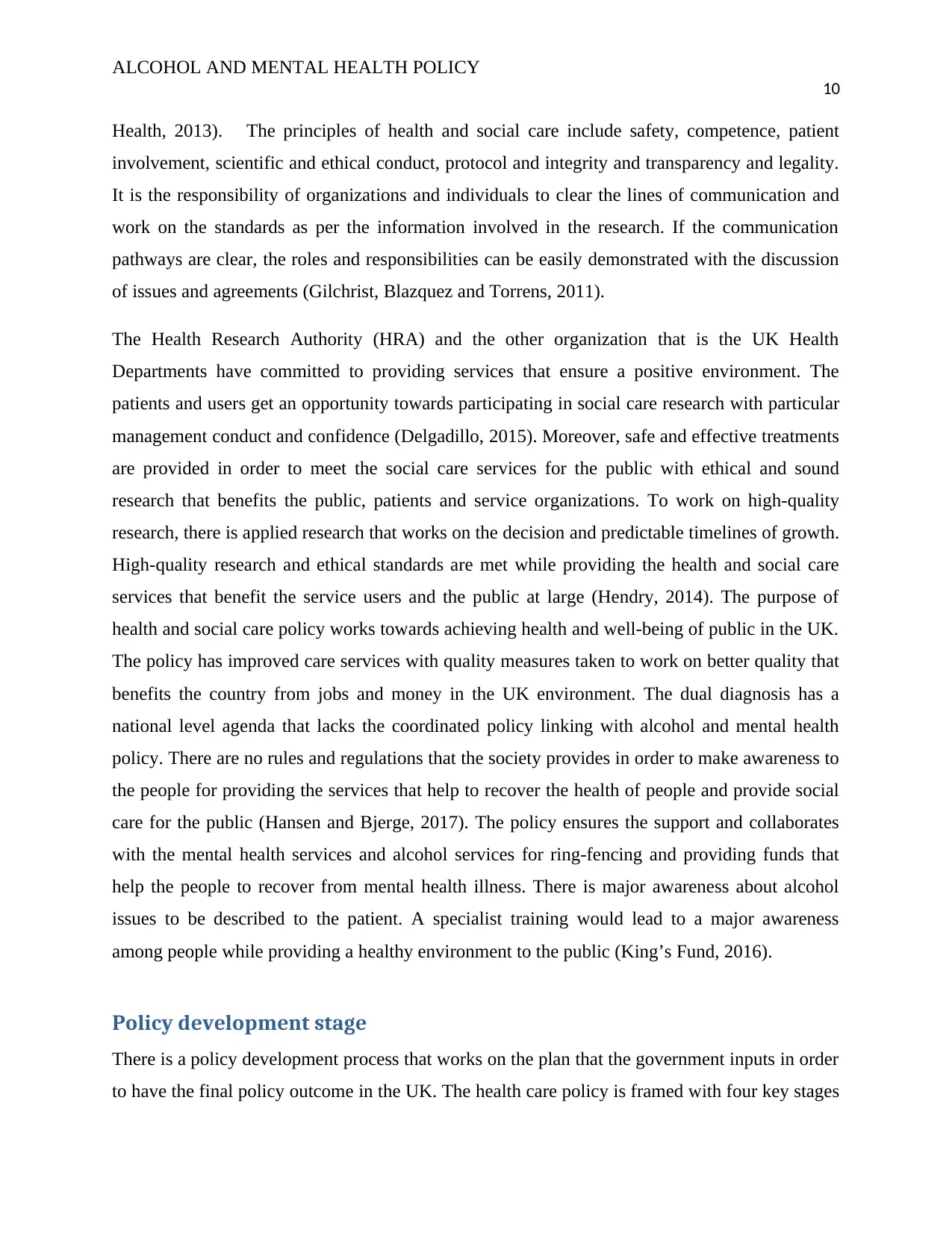
ALCOHOL AND MENTAL HEALTH POLICY
10
Health, 2013). The principles of health and social care include safety, competence, patient
involvement, scientific and ethical conduct, protocol and integrity and transparency and legality.
It is the responsibility of organizations and individuals to clear the lines of communication and
work on the standards as per the information involved in the research. If the communication
pathways are clear, the roles and responsibilities can be easily demonstrated with the discussion
of issues and agreements (Gilchrist, Blazquez and Torrens, 2011).
The Health Research Authority (HRA) and the other organization that is the UK Health
Departments have committed to providing services that ensure a positive environment. The
patients and users get an opportunity towards participating in social care research with particular
management conduct and confidence (Delgadillo, 2015). Moreover, safe and effective treatments
are provided in order to meet the social care services for the public with ethical and sound
research that benefits the public, patients and service organizations. To work on high-quality
research, there is applied research that works on the decision and predictable timelines of growth.
High-quality research and ethical standards are met while providing the health and social care
services that benefit the service users and the public at large (Hendry, 2014). The purpose of
health and social care policy works towards achieving health and well-being of public in the UK.
The policy has improved care services with quality measures taken to work on better quality that
benefits the country from jobs and money in the UK environment. The dual diagnosis has a
national level agenda that lacks the coordinated policy linking with alcohol and mental health
policy. There are no rules and regulations that the society provides in order to make awareness to
the people for providing the services that help to recover the health of people and provide social
care for the public (Hansen and Bjerge, 2017). The policy ensures the support and collaborates
with the mental health services and alcohol services for ring-fencing and providing funds that
help the people to recover from mental health illness. There is major awareness about alcohol
issues to be described to the patient. A specialist training would lead to a major awareness
among people while providing a healthy environment to the public (King’s Fund, 2016).
Policy development stage
There is a policy development process that works on the plan that the government inputs in order
to have the final policy outcome in the UK. The health care policy is framed with four key stages
10
Health, 2013). The principles of health and social care include safety, competence, patient
involvement, scientific and ethical conduct, protocol and integrity and transparency and legality.
It is the responsibility of organizations and individuals to clear the lines of communication and
work on the standards as per the information involved in the research. If the communication
pathways are clear, the roles and responsibilities can be easily demonstrated with the discussion
of issues and agreements (Gilchrist, Blazquez and Torrens, 2011).
The Health Research Authority (HRA) and the other organization that is the UK Health
Departments have committed to providing services that ensure a positive environment. The
patients and users get an opportunity towards participating in social care research with particular
management conduct and confidence (Delgadillo, 2015). Moreover, safe and effective treatments
are provided in order to meet the social care services for the public with ethical and sound
research that benefits the public, patients and service organizations. To work on high-quality
research, there is applied research that works on the decision and predictable timelines of growth.
High-quality research and ethical standards are met while providing the health and social care
services that benefit the service users and the public at large (Hendry, 2014). The purpose of
health and social care policy works towards achieving health and well-being of public in the UK.
The policy has improved care services with quality measures taken to work on better quality that
benefits the country from jobs and money in the UK environment. The dual diagnosis has a
national level agenda that lacks the coordinated policy linking with alcohol and mental health
policy. There are no rules and regulations that the society provides in order to make awareness to
the people for providing the services that help to recover the health of people and provide social
care for the public (Hansen and Bjerge, 2017). The policy ensures the support and collaborates
with the mental health services and alcohol services for ring-fencing and providing funds that
help the people to recover from mental health illness. There is major awareness about alcohol
issues to be described to the patient. A specialist training would lead to a major awareness
among people while providing a healthy environment to the public (King’s Fund, 2016).
Policy development stage
There is a policy development process that works on the plan that the government inputs in order
to have the final policy outcome in the UK. The health care policy is framed with four key stages
Paraphrase This Document
Need a fresh take? Get an instant paraphrase of this document with our AI Paraphraser
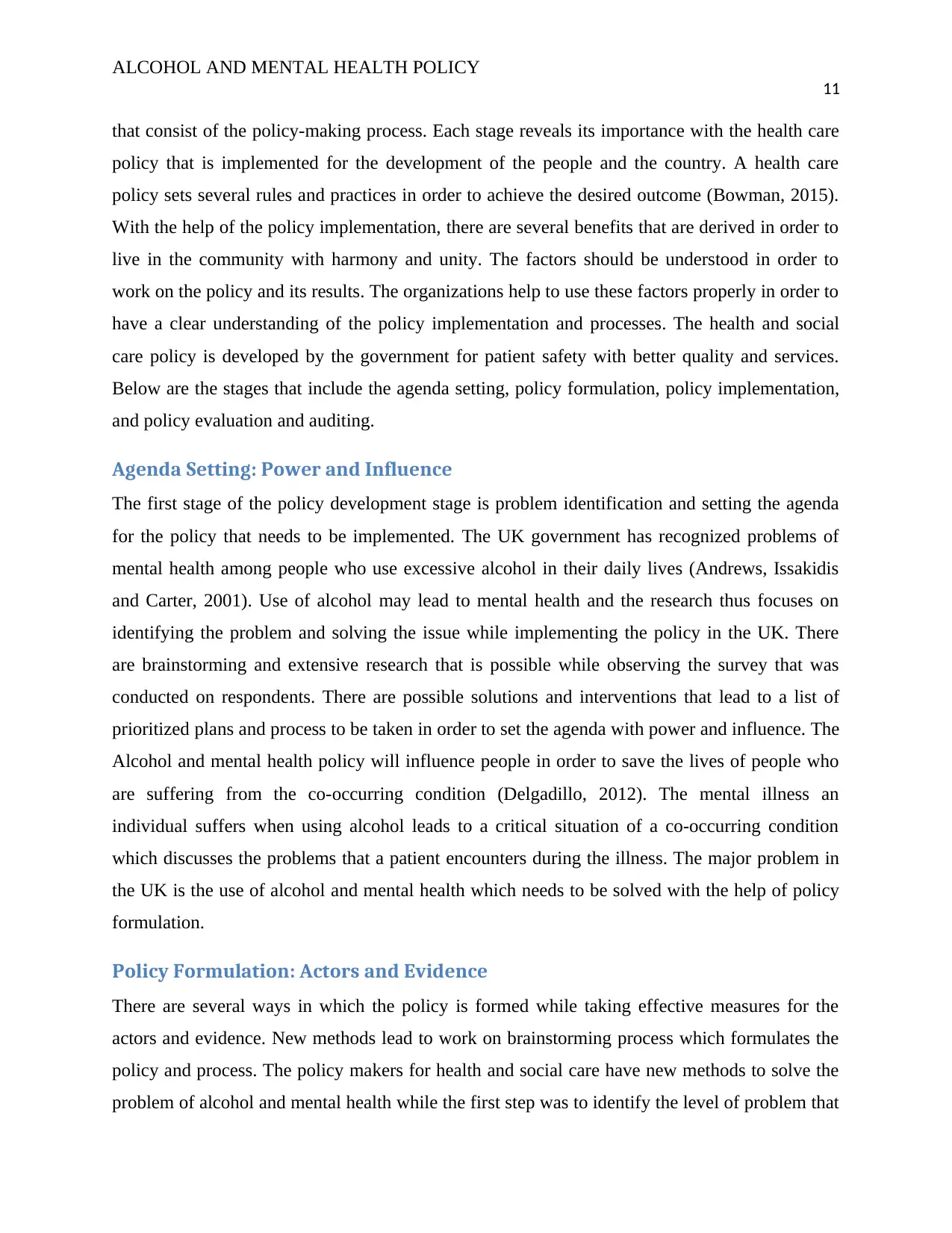
ALCOHOL AND MENTAL HEALTH POLICY
11
that consist of the policy-making process. Each stage reveals its importance with the health care
policy that is implemented for the development of the people and the country. A health care
policy sets several rules and practices in order to achieve the desired outcome (Bowman, 2015).
With the help of the policy implementation, there are several benefits that are derived in order to
live in the community with harmony and unity. The factors should be understood in order to
work on the policy and its results. The organizations help to use these factors properly in order to
have a clear understanding of the policy implementation and processes. The health and social
care policy is developed by the government for patient safety with better quality and services.
Below are the stages that include the agenda setting, policy formulation, policy implementation,
and policy evaluation and auditing.
Agenda Setting: Power and Influence
The first stage of the policy development stage is problem identification and setting the agenda
for the policy that needs to be implemented. The UK government has recognized problems of
mental health among people who use excessive alcohol in their daily lives (Andrews, Issakidis
and Carter, 2001). Use of alcohol may lead to mental health and the research thus focuses on
identifying the problem and solving the issue while implementing the policy in the UK. There
are brainstorming and extensive research that is possible while observing the survey that was
conducted on respondents. There are possible solutions and interventions that lead to a list of
prioritized plans and process to be taken in order to set the agenda with power and influence. The
Alcohol and mental health policy will influence people in order to save the lives of people who
are suffering from the co-occurring condition (Delgadillo, 2012). The mental illness an
individual suffers when using alcohol leads to a critical situation of a co-occurring condition
which discusses the problems that a patient encounters during the illness. The major problem in
the UK is the use of alcohol and mental health which needs to be solved with the help of policy
formulation.
Policy Formulation: Actors and Evidence
There are several ways in which the policy is formed while taking effective measures for the
actors and evidence. New methods lead to work on brainstorming process which formulates the
policy and process. The policy makers for health and social care have new methods to solve the
problem of alcohol and mental health while the first step was to identify the level of problem that
11
that consist of the policy-making process. Each stage reveals its importance with the health care
policy that is implemented for the development of the people and the country. A health care
policy sets several rules and practices in order to achieve the desired outcome (Bowman, 2015).
With the help of the policy implementation, there are several benefits that are derived in order to
live in the community with harmony and unity. The factors should be understood in order to
work on the policy and its results. The organizations help to use these factors properly in order to
have a clear understanding of the policy implementation and processes. The health and social
care policy is developed by the government for patient safety with better quality and services.
Below are the stages that include the agenda setting, policy formulation, policy implementation,
and policy evaluation and auditing.
Agenda Setting: Power and Influence
The first stage of the policy development stage is problem identification and setting the agenda
for the policy that needs to be implemented. The UK government has recognized problems of
mental health among people who use excessive alcohol in their daily lives (Andrews, Issakidis
and Carter, 2001). Use of alcohol may lead to mental health and the research thus focuses on
identifying the problem and solving the issue while implementing the policy in the UK. There
are brainstorming and extensive research that is possible while observing the survey that was
conducted on respondents. There are possible solutions and interventions that lead to a list of
prioritized plans and process to be taken in order to set the agenda with power and influence. The
Alcohol and mental health policy will influence people in order to save the lives of people who
are suffering from the co-occurring condition (Delgadillo, 2012). The mental illness an
individual suffers when using alcohol leads to a critical situation of a co-occurring condition
which discusses the problems that a patient encounters during the illness. The major problem in
the UK is the use of alcohol and mental health which needs to be solved with the help of policy
formulation.
Policy Formulation: Actors and Evidence
There are several ways in which the policy is formed while taking effective measures for the
actors and evidence. New methods lead to work on brainstorming process which formulates the
policy and process. The policy makers for health and social care have new methods to solve the
problem of alcohol and mental health while the first step was to identify the level of problem that
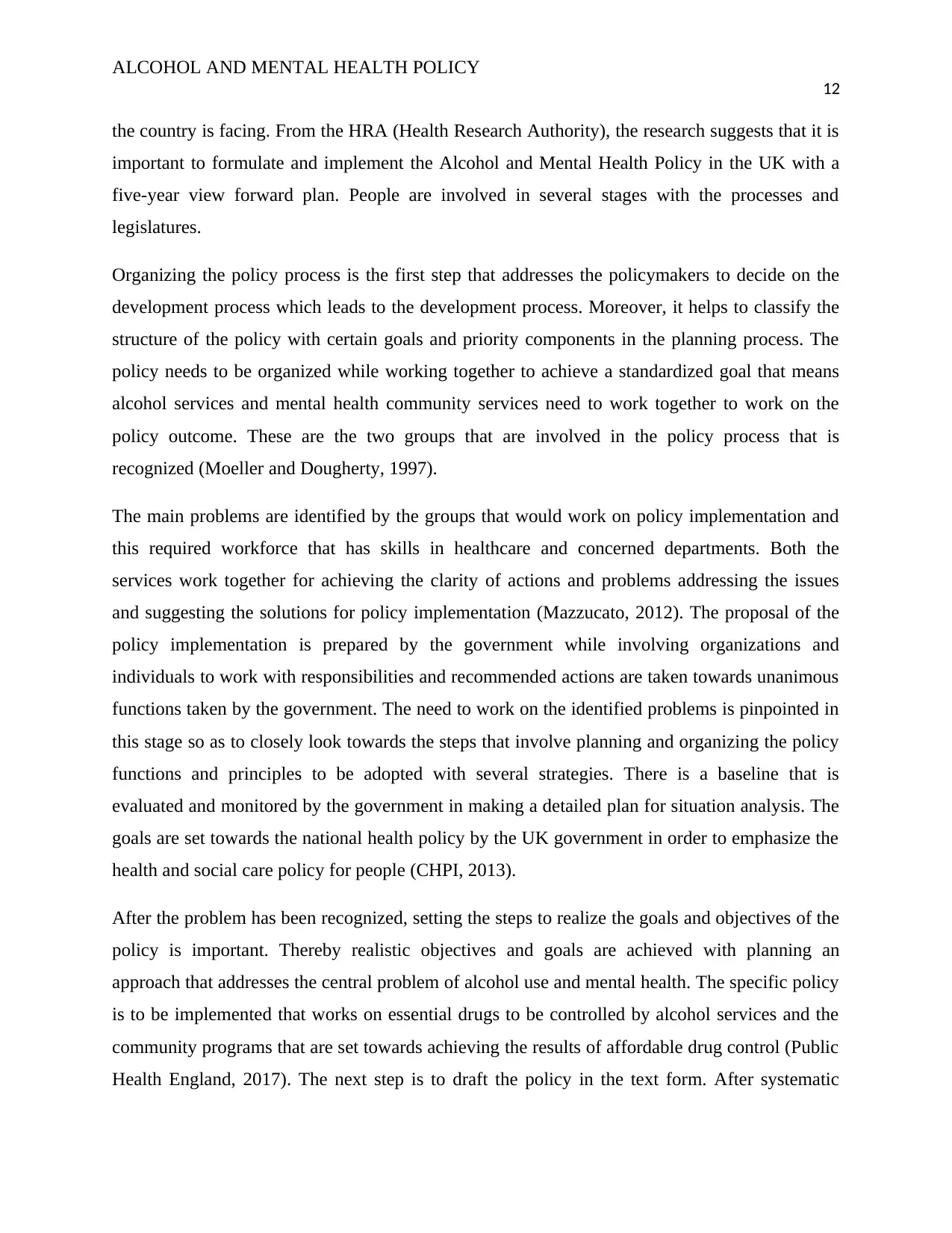
ALCOHOL AND MENTAL HEALTH POLICY
12
the country is facing. From the HRA (Health Research Authority), the research suggests that it is
important to formulate and implement the Alcohol and Mental Health Policy in the UK with a
five-year view forward plan. People are involved in several stages with the processes and
legislatures.
Organizing the policy process is the first step that addresses the policymakers to decide on the
development process which leads to the development process. Moreover, it helps to classify the
structure of the policy with certain goals and priority components in the planning process. The
policy needs to be organized while working together to achieve a standardized goal that means
alcohol services and mental health community services need to work together to work on the
policy outcome. These are the two groups that are involved in the policy process that is
recognized (Moeller and Dougherty, 1997).
The main problems are identified by the groups that would work on policy implementation and
this required workforce that has skills in healthcare and concerned departments. Both the
services work together for achieving the clarity of actions and problems addressing the issues
and suggesting the solutions for policy implementation (Mazzucato, 2012). The proposal of the
policy implementation is prepared by the government while involving organizations and
individuals to work with responsibilities and recommended actions are taken towards unanimous
functions taken by the government. The need to work on the identified problems is pinpointed in
this stage so as to closely look towards the steps that involve planning and organizing the policy
functions and principles to be adopted with several strategies. There is a baseline that is
evaluated and monitored by the government in making a detailed plan for situation analysis. The
goals are set towards the national health policy by the UK government in order to emphasize the
health and social care policy for people (CHPI, 2013).
After the problem has been recognized, setting the steps to realize the goals and objectives of the
policy is important. Thereby realistic objectives and goals are achieved with planning an
approach that addresses the central problem of alcohol use and mental health. The specific policy
is to be implemented that works on essential drugs to be controlled by alcohol services and the
community programs that are set towards achieving the results of affordable drug control (Public
Health England, 2017). The next step is to draft the policy in the text form. After systematic
12
the country is facing. From the HRA (Health Research Authority), the research suggests that it is
important to formulate and implement the Alcohol and Mental Health Policy in the UK with a
five-year view forward plan. People are involved in several stages with the processes and
legislatures.
Organizing the policy process is the first step that addresses the policymakers to decide on the
development process which leads to the development process. Moreover, it helps to classify the
structure of the policy with certain goals and priority components in the planning process. The
policy needs to be organized while working together to achieve a standardized goal that means
alcohol services and mental health community services need to work together to work on the
policy outcome. These are the two groups that are involved in the policy process that is
recognized (Moeller and Dougherty, 1997).
The main problems are identified by the groups that would work on policy implementation and
this required workforce that has skills in healthcare and concerned departments. Both the
services work together for achieving the clarity of actions and problems addressing the issues
and suggesting the solutions for policy implementation (Mazzucato, 2012). The proposal of the
policy implementation is prepared by the government while involving organizations and
individuals to work with responsibilities and recommended actions are taken towards unanimous
functions taken by the government. The need to work on the identified problems is pinpointed in
this stage so as to closely look towards the steps that involve planning and organizing the policy
functions and principles to be adopted with several strategies. There is a baseline that is
evaluated and monitored by the government in making a detailed plan for situation analysis. The
goals are set towards the national health policy by the UK government in order to emphasize the
health and social care policy for people (CHPI, 2013).
After the problem has been recognized, setting the steps to realize the goals and objectives of the
policy is important. Thereby realistic objectives and goals are achieved with planning an
approach that addresses the central problem of alcohol use and mental health. The specific policy
is to be implemented that works on essential drugs to be controlled by alcohol services and the
community programs that are set towards achieving the results of affordable drug control (Public
Health England, 2017). The next step is to draft the policy in the text form. After systematic
⊘ This is a preview!⊘
Do you want full access?
Subscribe today to unlock all pages.

Trusted by 1+ million students worldwide
1 out of 18
Related Documents
Your All-in-One AI-Powered Toolkit for Academic Success.
+13062052269
info@desklib.com
Available 24*7 on WhatsApp / Email
![[object Object]](/_next/static/media/star-bottom.7253800d.svg)
Unlock your academic potential
Copyright © 2020–2025 A2Z Services. All Rights Reserved. Developed and managed by ZUCOL.




